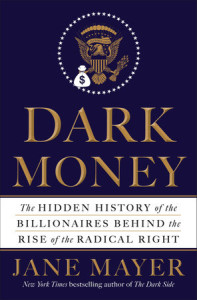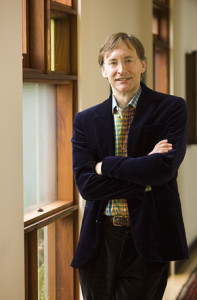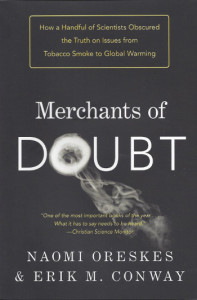In relation to Proctor’s work on ignorance of science, I just finished reading Naomi Oreskes’ and Erik Conway’s Merchants of Doubt, published in 2010. Their work builds on Proctor’s studies, which they cite. Oreskes and Conway detail how opposition groups and individuals built a “simulacrum” of mainstream science via an alternate universe of newsletters, magazines, journals, and conferences.[2] Not unlike Proctor, who Kenyon says was inspired by the misinformation spread by pro-tobacco groups, Oreskes and Conway root their narrative of scientific ignorance in efforts that began in the 1950s with the tobacco industry.
Merchants of Doubt is an excellent work on how a small group of hyper-Cold Warrior scientists become “merchants of doubt” on issues like tobacco risk, acid rain, the ozone hole, second-hand smoke, climate change. They even attacked the legacy of Rachel Carson, who had helped expose the dangers of DDT and other pesticides.The credibility of those “merchants” derived from their older scientific credentials (generally they were physicists) and industry respectability, the latter of which was obtained primarily from weapons work. They banned together in “think tanks”, such as the George C. Marshall Institute, to give their skepticism the patina of community. I look forward to Jason Stahl‘s forthcoming work on conservatism and think tanks, Right Moves: The Conservative Think Tank in American Political Culture since 1945 (North Carolina Press, April 2016) which will expand our knowledge of collaborative, ideologically-inflected misinformation. These mimetic institutions create, in Oreskes’ and Conway’s words, a “Potemkin village populated, in only a few cases, with actual scientists.”[3]
But the problem of ignorance is bigger than fostering controversy in relation to science. Don’t get me wrong: I’m a Robert Proctor fan, even though I haven’t yet read his famous study (it’s on my list for this year). And I too have some done some work on scientific ignorance, accidental and purposed, in relation to the anti-vaccination movement. As I attempted in that paper, the work of Oreskes, Conway, and Proctor get at a few deeper currents that cut across other streams of ignorance—namely, the issues of agency, power, and capitalism. In relation to those other streams, many also choose to know not, to know nothing, and to know little. It is the problem of anti-knowledge, and extends far beyond science and politics. The propagation of ignorance serves to empower some and disempower others, hence the need for political analyses, as will likely be seen in Stahl’s work.
There can be little doubt, as was shown in Oreskes’ and Conway’s book, that money, or monetary concerns, lies behind a fair portion of the merchandising of doubt. Indeed, the same Cold Warriors they study feared that new scientific work would cast doubt on capitalism as a viable world system. As such, numerous businessmen and industries funded the doubt merchants. Some of that heretofore hidden trail of think tank money will be exposed in Jane Mayer’s new book, Dark Money.  Mayer’s expose focuses on “The Koch Brothers,” meaning the billionaire conservative activists, David and Charles. [4]
Mayer’s expose focuses on “The Koch Brothers,” meaning the billionaire conservative activists, David and Charles. [4]
The harvesting of emotion in the service of power, politically or for commerce, is also troubling. Indeed, beyond Jacoby’s overwrought thesis, one could still argue that the United States seems to be in the midst of what could be called an Age of Emotion—i.e. Trump’s pandering, the Tea Party rage, raw Obama Hate, and the focused provocations of Wayne LaPierre. Our instant communication tools enable emotional extremes of rage and outrage. The distance embedded in those tools also enables, paradoxically, a lack of emotional knowledge, intelligence, and sensitivity. The newspapers, radio, television, Twitter, and Facebook reveal the expression of individual emotion and the ability to ignore the felt experience of others. It seems, at times, like democratized insensitivity. And this toxic mix of rage, hate, unreason, anti-reason, ideology, and anti-intellectualism forces one to consider these factors under the umbrella a ‘sensibility’—an anti-intellectual sensibility.
Next week I’ll follow this up with an historical exploration on the media and democratized ignorance. – TL
—————————————-
Notes
[1] Jacoby tried to take up the mantle of Richard Hofstadter, especially his famous 1962 work Anti-Intellectualism in American Life (New York: Random House-Vintage). But instead she created a personalized, nit-picky work that made those of us who really care about anti-intellectualism, ignorance, and ideology seem like, well, cranks. At best, Age of American Unreason is a highly readable introduction to those topics—that should be forgotten quickly once one moves on to more serious scholarly work. Jacoby’s book has been discussed here many times.
[2] Naomi Oreskes and Erik M. Conway, Merchants of Doubt: How a Handful of Scientists Obscured the Truth on Issues from Tobacco Smoke to Global Warming (New York: Bloomsbury Press, 2010), 244. They cited Proctor’s The Golden Holocaust (2012), which they saw in manuscript form. Here’s an article on that book.
[3] Oreskes/Conway, 245. Jason published a guest post here on his work in March 2012.
[4] Mayer’s book, which I just heard about a few days ago, is set to be released next week, on January 19, by Penguin-Random House.



8 Thoughts on this Post
S-USIH Comment Policy
We ask that those who participate in the discussions generated in the Comments section do so with the same decorum as they would in any other academic setting or context. Since the USIH bloggers write under our real names, we would prefer that our commenters also identify themselves by their real name. As our primary goal is to stimulate and engage in fruitful and productive discussion, ad hominem attacks (personal or professional), unnecessary insults, and/or mean-spiritedness have no place in the USIH Blog’s Comments section. Therefore, we reserve the right to remove any comments that contain any of the above and/or are not intended to further the discussion of the topic of the post. We welcome suggestions for corrections to any of our posts. As the official blog of the Society of US Intellectual History, we hope to foster a diverse community of scholars and readers who engage with one another in discussions of US intellectual history, broadly understood.
Tim—
Thanks for this post. I don’t know the work of Proctor or the field of agnotology, so excuse my ignorance (hah!). A couple of problems come to mind: first, we are all, all of the time, in a condition of massive ignorance about all kinds of matters—ignorance is not only the condition of a generally uneducated groups in society, but seems endemic to human beings in general—the things each of us can be said to know are massively outweighed by all the things we don’t (including our known unknowns and our unknown unknowns, as Donald Rumsfeld would say). It seems like the literature and field you are looking at chooses to consider areas of discrete knowledge that are socially controversial, in which a scientific establishment makes claims that are cast in doubt by a sizeable public group, rather than ignorance in general. But isn’t denialism—that is, direct contravention of the authority of scientific elites—different from ignorance? Since knowledge is socially distributed and highly segmented in a society like ours, there’s a basic conflict between a kind of democratic universalism rooted in Enlightenment notions of knowledge available to all through education, and the development of pockets of expertise by elites that rest on institutional power and authority and, ultimately, on social trust. If members of one group are highly suspicious of the social authority of another, distrusting its social agenda, it seems likely that they might come to the conclusion that the thing all of those elites believe is part of that agenda (that is, they might be vulgar Foucauldians, seeing knowledge as an expression of power). The Enlightenment dream of a neutral universal knowledge just doesn’t seem to apply to the social and epistemological conditions of twenty-first century societies.
Second, it seems like under these conditions that the “merchants of doubt” are actually utilizing some version (even if we might think of it as a corrupt version) of scientific epistemology, since it is science that has ideologically committed itself to the idea that truth arises out of doubt. The questioning of certitude, and the notion that science is itself not absolute but constantly available for critical revision sits at odds with the version of science as an established unchanging authority founded in positive knowledge. Ever since Descartes, however, the simultaneous commitment to the method of doubt and the notion that knowledge is foundational and cumulative has created fractures in scientific epistemology—one response, that American intellectual historians are probably most familiar with, was the Piercian and Jamesian pragmatic response, in which the method of doubt turned against foundationalism. Having freed science from received authority, the genie of critical doubt could, however, be put in the service of anti-science. There’s a perverse way in which science denialism is parasitic on scientific epistemology.
How do you (or Proctor and the field) deal with these issues? I guess I’m troubled by the idea that you can study ignorance as if it’s clear what knowledge is, and what it isn’t, when knowledge regimes in modern societies are both enormously powerful and based on constantly shifting and unstable commitments. Deliberate deception is a lot easier to identify than something as broad as “ignorance.” Sometimes the latter is just a recognition of human limitation.
Dan: Thanks for the long comment—all good points. This is a quick note to say that I’ll be back with a considered response this evening, at latest. – TL
Ignorance pervades our life. As a retired physician educator I tried to induce residents and students that much of what is taught is wrong, the half life of medical,knowledge is but five years, and treatments persist for decades as few are willing to accept other beliefs. Stuart Firesteins book,”Ignorance: how it drives science” helps. I gave a copy to a bright resident who thought my questioning of journal articles was cynical.
A nice review a few years ago relating science knowledge to decisions about the effect of carbon dioxide on the earth were based more on group behavior. The tribal aspect of human evolution makes it easy for us to identify with a group of like minded folks.
Fun stuff to read. Thanks for sharing with those of us decades out of college and graduate school.
Dan: My apologies for this delayed reply. I had an after-work engagement last night—one that I didn’t remember when I promised an evening response.
You are correct that, existentially, all humans live continually in a condition of massive ignorance of all kinds of matters. With that, the essence of education, from ancient times (as I see it), is to both know ourselves and what we don’t know (i.e. Socratic ignorance, questioning our certainty/certainties, etc.). It’s important to approach education/learning—about all subjects—with a sense of wonder and questioning. So yes, doubt is also a virtue that should be cultivated. But how far? When does doubt and questioning become unreasonable? When should doubt be suspended?
What matters to me is a kind of relative ignorance on subjects that either require or have normative baselines. What kinds of matters? And relative to what baseline norms?
I’m sorry for the lists that follow, but it’s the easiest way to summarize my thoughts on these matters. I’ve been thinking about many areas (which would be whittled down for a book):
(1) politics (defined broadly to include civics, policy awareness, foreign affairs, and spin/polemics);
(2) education (proper ends/goals);
(3) science (climate, vaccination, medicine/health generally);
(4) mathematics (esp. statistics, risk, probability);
(5) history (concerns about what we don’t know);
(6) news consumption and journalism (print culture, internet);
(7) social sciences (esp. psychology and economics)
(8) morality & ethics (i.e. “common sense”, bible)
(9) religion (i.e. bible again, theology)
(10) war (i.e. aggression, imperialism, risk assessment, outcomes)
(11) race (i.e. pseudoscience)
(12) language (i.e. plain speech v. specialization)
What are norms of knowledge on these topics? Those are educational questions, both institutional and in terms of life-long learning—i.e. how much to expect on the latter. But we put children through 12 years of schooling, at a minimum, with the hope that they obtain some baseline familiarity with knowns and unknowns on these issues. We set up elaborate curricula and testing mechanisms in our schools to assess whether each student achieves some kind of normative knowledge or familiarity at least, with these topics (excepting religion).
Okay, so what of things that complicate knowledge on these subject areas?
(1) Denialism – This is important to my own thinking about unreason, ignorance, anti-intellectualism, and ultra ideologies. This goes to the work of Proctor, Oreskes, Conway, and I hope Stahl. It’s about the production of anti-knowledge and how to detect it (i.e. mimetic qualities).
(2) Enlightenment/modernity – What to expect from this project, and its particular fate in 20th/21st century America? Grouped under this topic could be expertise and hostility to it.
(3) Critical thinking – Strengths and virtues, as well as limits.
(4) Democracy and equality
(5) The psychology of assessing ignorance (i.e. cognitive limits, issues, paranoia, cognitive dissonance)
(6) Cosmopolitanism (i.e. local v. global, expectations)
(7) Emotions
(8) Ideologies (ultra and softer)
(9) Human frailties (proneness to error, imperfections, failsafe techniques)
(10) Partial and half reasoning
Finally, meta topics:
(1) Reactions against perceived ignorance, anti-intellectualism and ignorance – and perceptions of those writing those you’re-stupid screeds
(2) Theory and definitions – key terms of narrative and discussion
(3) Historiography
So this is how I’m dealing with these issues as I prepare for a book project. I know I haven’t answered all of your questions, but I at least wanted to put the outlines of my thinking on display. I think many of the things in my cross-currents list apply to issues in your comment. – TL
Thanks Tim. I think some of these issues about democracy and public knowledge go to a long-standing discourse and set of arguments going back to Dewey and Lippmann in the 1920s, if not before. Good luck with wrangling this beast for your book project!
Indeed. Lippmann’s *The Public Philosophy* book has come up several times in my reading around these issues. – TL
pardon the conference plug, but since Proctor is on the Stanford faculty, he may well turn up at USIH in October, and might be a great commentator on these issues!
Oh man, that would be awesome.